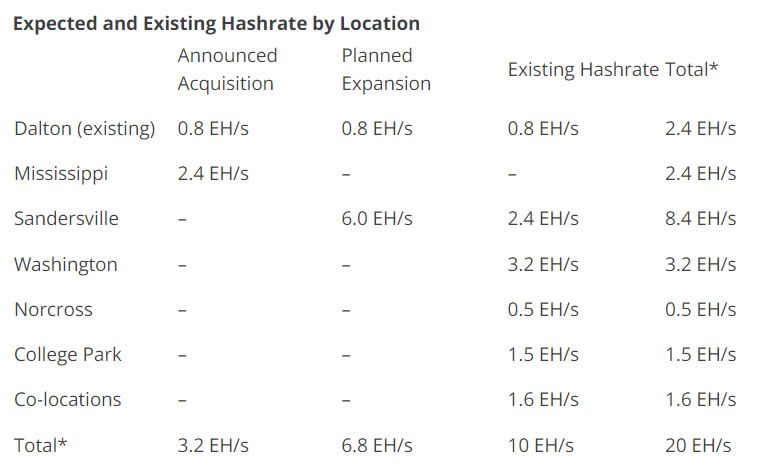Bitcoin Mining in the Firing Line, CleanSpark Expands Operations

[ad_1]
Bitcoin mining giant CleanSpark has announced new acquisitions in the US state of Mississippi to boost its hash rate. However, the move comes amid intensifying regulatory scrutiny of the industry from anti-crypto politicians.
CleanSpark has acquired three turnkey Bitcoin mining facilities in Mississippi for $19.8 million, according to a February 6 announcement.
CleanSpark Bitcoin Mining Expansion
The two Mississippi sites are expected to provide 2.4 EH/s (exahashes per second) of hashing power. The firm also acquired a third mining site under construction in Dalton, Georgia, for $3.4 million. The Dalton site is projected to operate at 0.8 EH/s upon its completion in April 2024.
With its two existing Dalton facilities, CleanSpark will have 2.4 EH/s total capacity there. Combined with its Sandersville expansion, these deals will boost capacity above 20 EH/s in the first half of 2024, doubling its current operating hash rate of 10 EH/s.
CEO Zach Bradford commented on the expansion:
“With the addition of Mississippi to our portfolio, we are gradually increasing our geographic diversity and expect to apply our proven track record of success in this new and exciting operating environment.”
In January, CleanSpark announced a strategic agreement to purchase up to 160,000 S21 miners.

Nevertheless, the move comes amid increasing political backlash against Bitcoin mining in the United States.
On January 31, the US Energy and Information Administration (EIA) announced that it was initiating the collection of data regarding electricity use by crypto miners.
A Politically-Motivated Attack
However, industry activists and energy experts have called the move a politically-motivated attack on crypto. On February 6, the head of public policy at Riot Patforms, Brian Morgenstern, said,
“There’s no emergency and this has nothing to do with transparency. It is a politically-motivated attack on Bitcoin driven by the self-appointed ‘anti-crypto’ Senator Elizabeth Warren.”
The data shows that miners enhance grid stability and have a negative correlation with grid stress, he added.
Read more: Is Crypto Mining Profitable in 2024?
Crypto ESG campaigner Daniel Batten echoed the sentiment, stating:
“Senator Warren already has almost all the data she needed from EIA in order to launch a new assault that Bitcoin poses a ‘public harm.’”

There have been no investigations of the myriad of grid-stabilization, renewable-transition enabling, decarbonization, and cost-lowering benefits of Bitcoin, he said.
Power grid owners and operators have shown evidence of all of these. Independent reports from KPMG and peer-reviewed research from Cornell University also supplement this.
“But the truth is not important,” Batten said, before adding:
“What’s important is there is enough partial data to spin a story and whip up enough moral outrage to deliver her banker donors the outcome they want: activate regulatory levers to weaken Bitcoin as an asset class and weaken Bitcoin mining as an industry.”
Disclaimer
In adherence to the Trust Project guidelines, BeInCrypto is committed to unbiased, transparent reporting. This news article aims to provide accurate, timely information. However, readers are advised to verify facts independently and consult with a professional before making any decisions based on this content. Please note that our Terms and Conditions, Privacy Policy, and Disclaimers have been updated.
[ad_2]
Source link









